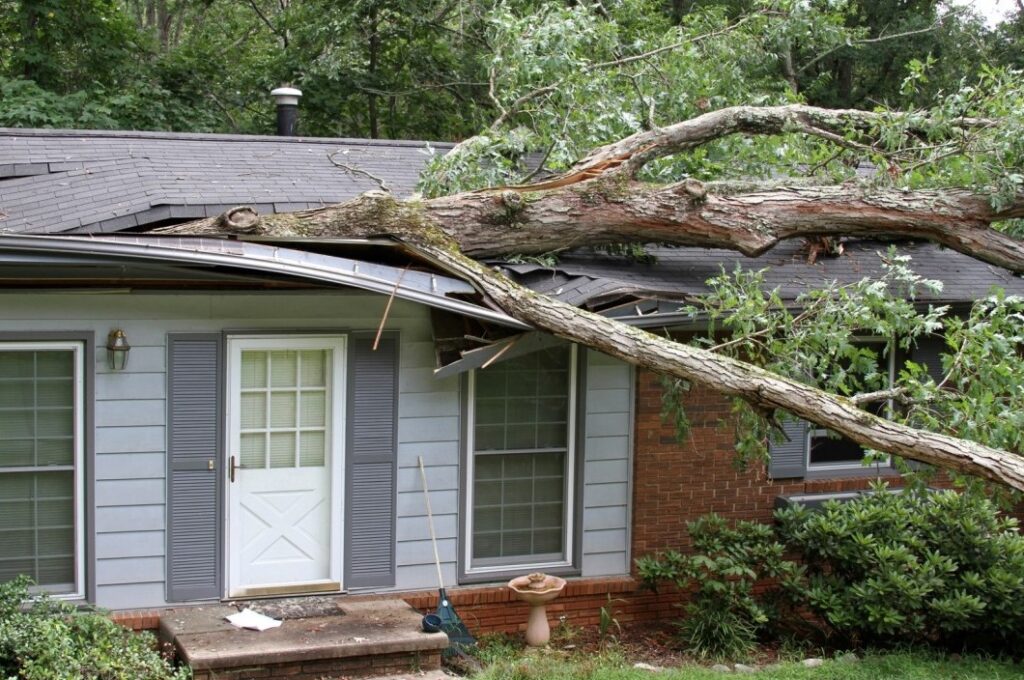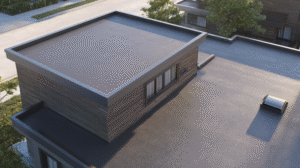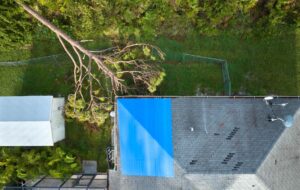When severe New Hampshire weather catches homeowners off guard, roof damage can escalate fast. That’s when having homeowners insurance and a roofing partner who understands how that coverage works becomes invaluable. At Dover Roofing LLC, we’ve helped countless Seacoast families navigate the stress of emergency roof repairs, from the first roof inspection to the final shingle installation. The benefit of today’s insurance policies is clear: when sudden, unavoidable damage strikes, they exist to protect both your home and your wallet. And in a climate where storms, nor’easters, heavy snow, and wind events are a regular part of life, many Dover homeowners will need that protection sooner or later.
New Hampshire weather is notoriously unpredictable. One week may bring gentle coastal rainfall, and the next could deliver hurricane-remnant winds barreling up the coastline or a March snowstorm dropping two feet of wet, heavy snow. These shifts create conditions that frequently lead to emergency roofing issues, leaks, structural strain, torn-off shingles, impact damage, and more. Whether your home features asphalt shingles, cedar shakes, metal roofing, or slate, sudden weather damage requires immediate attention to protect the structure beneath. That’s where our 24/7 emergency repair service steps in, backed by decades of technical expertise and a commitment to guiding homeowners through both the repair process and the insurance claim journey.
Common Emergency Roof Repairs in New Hampshire
Because of the region’s climate, certain types of roofing emergencies happen more often. Dover Roofing LLC sees the same patterns year after year, especially during late fall, winter, and spring thaw.
Wind Damage: Powerful wind gusts can tear shingles away, loosen flashing, detach metal panels, and even expose the underlayment. If left unaddressed, wind damage almost always leads to leaks and interior water intrusion.
Snow and Ice Damage: Heavy snow loads can strain older roofs, while ice dams force melting snow backward under shingles, causing hidden leaks. Ice-melt intrusion often remains unnoticed until ceilings stain or insulation becomes soaked.
Hail Damage: While not an everyday occurrence in the Seacoast region, hailstorms do strike New Hampshire each year. Hail impacts can crack shingles, dent metal roofing, and weaken protective granules.
Fallen Trees and Debris: Large branches, uprooted trees, or wind-blown debris can puncture the roof deck or damage gutters and ridge caps.
Flashing Failures During Storms: In high-wind or heavy-rain events, flashing around chimneys, skylights, and vents can peel back or loosen, opening the door to sudden leaks.
These emergencies often unfold fast, and because moisture spreads quietly, what starts as a small puncture can become major structural damage in just days. New Hampshire insurers understand this, which is why many emergency roof repairs are covered, as long as certain conditions are met.
What’s Typically Covered by Home Insurance in New Hampshire
While every policy is different, New Hampshire homeowners’ insurance generally covers sudden, accidental, and weather-related roof damage. That means most emergency roof repair scenarios fall under “covered perils.” Here are the categories that most insurers include:
1. Wind Damage
This is one of the most common types of roof insurance claims in NH. If strong winds rip off shingles, detach metal roofing, or damage the roof deck, insurance typically covers both immediate repairs and long-term restoration.
2. Fallen Trees or Storm Debris
When storm winds send limbs crashing into your roof, causing structural or surface damage, insurance usually pays for both roof repairs and removal of the fallen debris.

3. Hail Damage
Even small hailstones can bruise shingles or dent metal panels. Insurance adjusters in New Hampshire are trained to identify hail impact patterns, and hail damage is most often covered.
4. Snow, Ice, and Ice Dams
Coverage varies slightly by policy, but many insurance plans cover damage caused by the weight of snow or sudden water intrusion from ice dams. The key factor is whether the damage is unexpected, not caused by years of neglect.
5. Water Leaks from Storm-Related Openings
If high winds or impact events create a hole or opening through which water enters, the resulting interior damage is typically covered along with the roof repair.
What Insurance Usually Does Not Cover
It’s equally important for homeowners to know where insurance carriers draw the line. Most New Hampshire policies exclude:
- Damage caused by old age, wear, or neglect
- Rot, mold, or long-term deterioration
- Cosmetic issues without functional damage
- Pre-existing leaks
This is why professional documentation, from the moment the damage occurs, is essential. It helps distinguish sudden damage from long-term aging, strengthening your claim.
How Dover Roofing LLC Helps You Navigate the Process
Insurance claims can feel complicated, especially in the middle of a roofing emergency. Dover Roofing LLC takes pride in guiding homeowners through the process:
- We conduct personalized roofing inspections and document the damage thoroughly.
- Our team assists with insurance claim communication, providing photos, notes, and explanations that insurers rely on.
- We make immediate temporary repairs to prevent further damage, which insurers often reimburse when properly documented.
- Once approved, we deliver durable, warranty-backed roof repairs or replacements that bring your home back to full strength.
Ready to Learn More?
If severe weather has damaged your roof, don’t wait. New Hampshire storms move fast, and small issues escalate quickly. Contact Dover Roofing LLC for 24/7 emergency roof repair in the Seacoast region. Our experienced, family-owned team will secure your home, assist with your insurance claim, and help to restore your roof with workmanship you can trust. Reach out today and let us help protect your home when it matters most.



